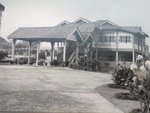[Reuters reported on Thursday, 25th Sept 2008 that Brunei is building a refinery expecting to cost around $3 billion]
BANDAR SERI BEGAWAN, Sept 25 (Reuters) - The expected cost of a proposed refinery project in Brunei could rise from an initial estimate of $3 billion due to rising steel prices, the chief of PetroBru said.
Mohd Zaman Noordin, chief executive of the small, privately held firm which won approval last November from Brunei to do a feasibility study on the project, said PetroBru was in talks with potential customers from Kuwait and China to take products from the refinery.
"Other than these two, we are also in talks with a few other parties. None of these have been concretely finalised yet, because I think to an extent some of them are waiting for the results from the detailed feasibility study," he told a news conference.
Steel prices peaked in July at above $1,000 a tonne for Chinese hot rolled coil, but has since retreated to around $825, tracking losses in other base metals prices.
If it is built, the plant on Pulau Muara Besar -- earmarked as Brunei's new deepwater hub for regional markets -- will have a preliminary capacity of 200,000 barrels per day (bpd) and a maximum capacity of 500,000 bpd.
PetroBru has appointed consultancy Wood Mackenzie to lead a detailed economic feasibility study for the project and construction would begin in 2012 or 2013, depending on its outcome.
The project would be the first world-class refining complex in the oil-rich sultanate, which now has a 10,000-bpd plant run by Brunei Shell Petroleum (RDSa.L: Quote, Profile, Research, Stock Buzz).
PetroBru, 26 percent-owned by Malaysia's TRC Synergy (TRCG.KL: Quote, Profile, Research, Stock Buzz), has completed an economic viability study for the refinery which will produce jet fuel and diesel. (Reporting by David Chance; Editing by Ramthan Hussain)
Welcome to my private journal generally on Brunei issues. Any opinions expressed are in my personal capacity. All rights to the articles are reserved.
Friday, September 26, 2008
Sunday, September 21, 2008
Claims in Jersey
[Note: This article written by Ben Quérée was published in the Jersey Evening Post on 20th September 2008]
ATTEMPTS to reclaim billions of dollars worth of assets allegedly stolen by the younger brother of the Sultan of Brunei have reached Jersey’s Royal Court.
The case involves the Sultan – one of the world’s wealthiest men – and his younger brother Prince Jefri who used to be the oil-rich country’s Minister of Finance.
The Prince has been ordered by the court to hand over shares in Karinska Ltd held by Fidelis Nominees Ltd and Rostand Nominees Ltd, and shares in Greencap Ltd held by Premier Circle Ltd, Second Circle Ltd and Third Circle Ltd.
Prince Jefri was accused in February 2000 of ‘misappropriation and misapplication’ of more than $15 bn worth of state assets.
But he agreed a deal in May that year to return the assets in return for immunity from any criminal or civil action.
However, although some assets were returned over the following year – and some valuable diamonds were handed over in 2007 – there are still many billions worth of assets outstanding.
ATTEMPTS to reclaim billions of dollars worth of assets allegedly stolen by the younger brother of the Sultan of Brunei have reached Jersey’s Royal Court.
The case involves the Sultan – one of the world’s wealthiest men – and his younger brother Prince Jefri who used to be the oil-rich country’s Minister of Finance.
The Prince has been ordered by the court to hand over shares in Karinska Ltd held by Fidelis Nominees Ltd and Rostand Nominees Ltd, and shares in Greencap Ltd held by Premier Circle Ltd, Second Circle Ltd and Third Circle Ltd.
Prince Jefri was accused in February 2000 of ‘misappropriation and misapplication’ of more than $15 bn worth of state assets.
But he agreed a deal in May that year to return the assets in return for immunity from any criminal or civil action.
However, although some assets were returned over the following year – and some valuable diamonds were handed over in 2007 – there are still many billions worth of assets outstanding.
Monday, September 15, 2008
BIA's Hotel Expansion
Note: Dominic Walsh in the UK Times (15th September 2008) wrote this article.
After years of talking about expanding its luxury hotel business, the Brunei Investment Agency (BIA) is finally investing. Having recently added the Hotel Bel-Air in Los Angeles and the New York Palace in Manhattan to its exclusive chain, it is preparing to invest almost £100 million converting two more landmark properties in Britain into hotels for the rich and famous.
Christopher Cowdray, the man charged with overseeing the BIA's hotel expansion plan, is casting his eye over trophy hotels throughout Europe and North America with a view to persuading their owners to sell to the BIA or hand over control under a long-term management contract.
Last November, Mr Cowdray, a former managing director of Claridge's, was named chief executive of the Dorchester Collection, the BIA's hotel management business, with a brief to expand from five hotels to fifteen by 2015. “There's an enormous opportunity to grow the Collection,” he said.
Management contracts are a departure for the group, which until now has run properties owned by the BIA, itself ultimately controlled by the Sultan of Brunei. The Bel-Air and New York Palace were both seized by the BIA from Prince Jefri Bolkiah, the Sultan's brother, after a legal battle over state-owned assets.
As well as planning a $200 million (£112 million) revamp of the New York Palace, Mr Cowdray is starting plans to convert two Brunei-owned properties in London and Berkshire into the next part of the Dorchester Collection. The first, due to open in 2010, is the former Playboy Club, next door to The Dorchester itself — but forget the Bunny Girls. The 50-room hotel envisaged under the proposed £40 million refit will create a sophisticated look a million miles from the casino that was closed down in 1982 over suspected gaming irregularities.
Mr Cowdray said that although the hotel, to be called 45 Park Lane, would be run as an adjunct to the Dorchester, it would have a more contemporary feel. “The price-point will be very similar — at the top end — but it will have its own personality. It will be modern rather than traditional and will appeal to a different audience.”
The other project occupying the Zimbabwe-born hotelier's time is Coworth Park, a stately home and 200-acre estate near Ascot acquired by the Sultan a few years ago. Subject to all necessary planning consents, the Georgian house will provide 35 bedrooms and suites and a further 35 rooms will be created from the stables and various cottages.
The Coworth polo centre will become an equestrian complex and polo will still be played. “Most hotels of this sort have golf, but with Wentworth near by there's no point developing a golf course. I want to keep the polo aspect to it because polo tournaments are great fun. It's becoming very popular and brings a unique aspect.”Despite the Dorchester Collection's royal connections, Mr Cowdray rejects any suggestion that it is merely a rich man's plaything. “The hotels all make a good return. You have targets and measurements and staff respond to those. When businesses become very soft and fluid, they lose direction and when you get economic downturns they are not able to respond.”
Despite the economic climate, Mr Cowdray claims that the company has been unaffected so far, with earnings in the first half up 15 per cent at £35.5 million. “We don't seem to have been affected by recession,” he said. “The difference is that the market we deal in is a bit more resilient. It's also shifted, so while the UK and US economies are a bit down, we've got economies such as Russia, the Middle East, China and the Far East that are up.”
The nature of the company's clientele — guests at the Dorchester include Nelson Mandela, Nicole Kidman, the Hollywood actress, and numerous heads of state — mean that even a full recession is likely to have a relatively limited impact as the super-rich and super-famous continue to seek out the most exclusive hotels in the world.
After years of talking about expanding its luxury hotel business, the Brunei Investment Agency (BIA) is finally investing. Having recently added the Hotel Bel-Air in Los Angeles and the New York Palace in Manhattan to its exclusive chain, it is preparing to invest almost £100 million converting two more landmark properties in Britain into hotels for the rich and famous.
Christopher Cowdray, the man charged with overseeing the BIA's hotel expansion plan, is casting his eye over trophy hotels throughout Europe and North America with a view to persuading their owners to sell to the BIA or hand over control under a long-term management contract.
Last November, Mr Cowdray, a former managing director of Claridge's, was named chief executive of the Dorchester Collection, the BIA's hotel management business, with a brief to expand from five hotels to fifteen by 2015. “There's an enormous opportunity to grow the Collection,” he said.
Management contracts are a departure for the group, which until now has run properties owned by the BIA, itself ultimately controlled by the Sultan of Brunei. The Bel-Air and New York Palace were both seized by the BIA from Prince Jefri Bolkiah, the Sultan's brother, after a legal battle over state-owned assets.
As well as planning a $200 million (£112 million) revamp of the New York Palace, Mr Cowdray is starting plans to convert two Brunei-owned properties in London and Berkshire into the next part of the Dorchester Collection. The first, due to open in 2010, is the former Playboy Club, next door to The Dorchester itself — but forget the Bunny Girls. The 50-room hotel envisaged under the proposed £40 million refit will create a sophisticated look a million miles from the casino that was closed down in 1982 over suspected gaming irregularities.
Mr Cowdray said that although the hotel, to be called 45 Park Lane, would be run as an adjunct to the Dorchester, it would have a more contemporary feel. “The price-point will be very similar — at the top end — but it will have its own personality. It will be modern rather than traditional and will appeal to a different audience.”
The other project occupying the Zimbabwe-born hotelier's time is Coworth Park, a stately home and 200-acre estate near Ascot acquired by the Sultan a few years ago. Subject to all necessary planning consents, the Georgian house will provide 35 bedrooms and suites and a further 35 rooms will be created from the stables and various cottages.
The Coworth polo centre will become an equestrian complex and polo will still be played. “Most hotels of this sort have golf, but with Wentworth near by there's no point developing a golf course. I want to keep the polo aspect to it because polo tournaments are great fun. It's becoming very popular and brings a unique aspect.”Despite the Dorchester Collection's royal connections, Mr Cowdray rejects any suggestion that it is merely a rich man's plaything. “The hotels all make a good return. You have targets and measurements and staff respond to those. When businesses become very soft and fluid, they lose direction and when you get economic downturns they are not able to respond.”
Despite the economic climate, Mr Cowdray claims that the company has been unaffected so far, with earnings in the first half up 15 per cent at £35.5 million. “We don't seem to have been affected by recession,” he said. “The difference is that the market we deal in is a bit more resilient. It's also shifted, so while the UK and US economies are a bit down, we've got economies such as Russia, the Middle East, China and the Far East that are up.”
The nature of the company's clientele — guests at the Dorchester include Nelson Mandela, Nicole Kidman, the Hollywood actress, and numerous heads of state — mean that even a full recession is likely to have a relatively limited impact as the super-rich and super-famous continue to seek out the most exclusive hotels in the world.
Subscribe to:
Comments (Atom)






